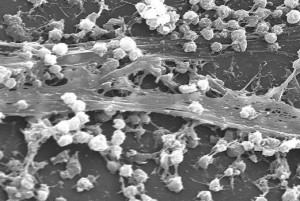Vancomycin-resistant MRSA superbug found in Brazil
PRESS RELEASE
An international research team led by Cesar A. Arias, M.D., Ph.D., at The University of Texas Health Science Center at Houston (UTHealth) has identified a new superbug that caused a bloodstream infection in a Brazilian patient. The report appeared in the April 17 issue of The New England Journal of Medicine.

Credits: CDC/Janice Carr
The new superbug is part of a class of highly-resistant bacteria known as methicillin-resistant Staphylococcus aureus or MRSA, which is a major cause of hospital and community-associated infections. The superbug has also acquired high levels of resistance to vancomycin, the most common and least expensive antibiotic used to treat severe MRSA infections worldwide.
Most worrisome is that genomic analyses indicated that this novel vancomycin-resistant MRSA superbug belongs to a genetic lineage that is commonly found outside hospitals (designated community-associated MRSA), said Arias, the report’s senior author and an associate professor of medicine, microbiology and molecular genetics at the UTHealth Medical School. For more infectious disease news and information, visit and “like” the Infectious Disease News Facebook page
Previous research has suggested that community-associated MRSA can disseminate rapidly among people and is responsible for the majority of skin and soft tissue infections (sores) in patients of all ages. Some of these infections can become serious and even fatal.
Since community-associated MRSA is thought to be transmitted mainly by skin contact, the new superbug may affect not only sick people or those with a weakened immune system but also healthy individuals, according to Arias. Apart from causing localized skin infections, the MRSA superbug has the ability to invade the bloodstream and may become a serious threat.
“This is the first-ever reported bloodstream infection caused by a highly vancomycin-resistant MRSA bacteria,” Arias said. “If we lose vancomycin, it would make it very difficult and expensive to treat these infections,” he said.
Arias and his colleagues conducted microbiological and genetic analyses of an MRSA superbug recovered from the blood of a 35-year-old Brazilian man and identified a novel transferable genetic element (plasmid) that carries the genes necessary for vancomycin resistance (vanA gene cluster).
“The presence and dissemination of community-associated MRSA containing vanA could become a serious public health concern,” report the authors in the paper.
However, since this is the only documented case of this type of infection, Arias said, it is too early to tell if this specific superbug will lead to a bigger threat.
Barbara E. Murray, M.D., report co-author and director of the Division of Infectious Diseases at the UTHealth Medical School, said, “The worst resistance possible has now appeared in the community-associated MRSA clone.”
What is the next step?
“There will have to be increased surveillance in South America and worldwide in the future,” said Murray, who is the holder of the J. Ralph Meadows Professorship in Internal Medicine at the UTHealth Medical School and president of the Infectious Diseases Society of America.
Arias leads the UTHealth Medical School Laboratory for Antimicrobial Research, which focuses on studying the clinical and molecular aspects of antibiotic resistance, attempting to understand the complex mechanisms by which superbugs become resistant to antibiotics and then designing new strategies to fight them.
Arias is also the founder and scientific director of the Molecular Genetics and Antimicrobial Resistance Unit at Universidad El Bosque in Bogota, Colombia and co-directs the International Center for Microbial Genomics at the same university. These research units have become a major surveillance center for resistance pathogens in South America. The collaborative work derived from these laboratories has identified novel trends in antimicrobial resistance and has characterized the emergence of particular superbugs in the region.















